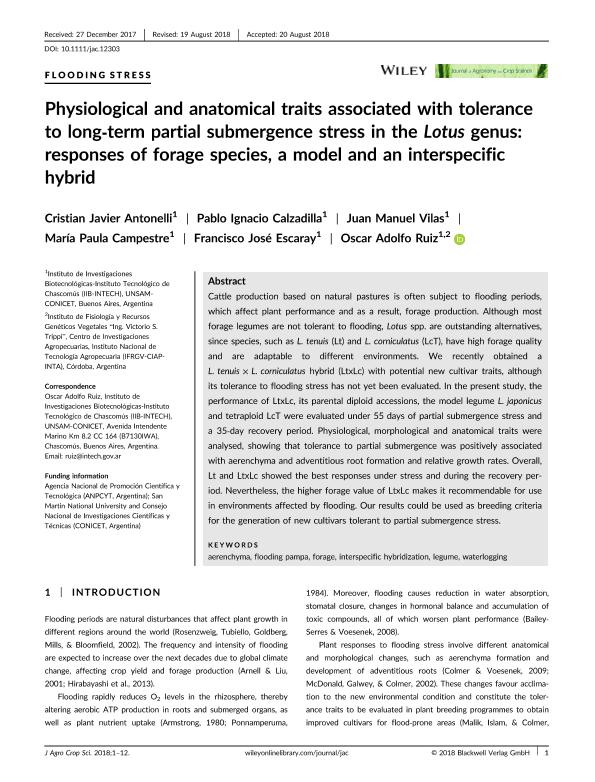Artículo
Physiological and anatomical traits associated with tolerance to long-term partial submergence stress in the Lotus genus: responses of forage species, a model and an interspecific hybrid
Antonelli, Cristian Javier ; Calzadilla, Pablo Ignacio
; Calzadilla, Pablo Ignacio ; Vilas, Juan Manuel
; Vilas, Juan Manuel ; Campestre, Maria Paula
; Campestre, Maria Paula ; Escaray, Francisco José
; Escaray, Francisco José ; Ruiz, Oscar Adolfo
; Ruiz, Oscar Adolfo
 ; Calzadilla, Pablo Ignacio
; Calzadilla, Pablo Ignacio ; Vilas, Juan Manuel
; Vilas, Juan Manuel ; Campestre, Maria Paula
; Campestre, Maria Paula ; Escaray, Francisco José
; Escaray, Francisco José ; Ruiz, Oscar Adolfo
; Ruiz, Oscar Adolfo
Fecha de publicación:
06/09/2018
Editorial:
Wiley Blackwell Publishing, Inc
Revista:
Journal of Agronomy and Crop Science
ISSN:
0931-2250
Idioma:
Inglés
Tipo de recurso:
Artículo publicado
Clasificación temática:
Resumen
Cattle production based on natural pastures is often subject to flooding periods, which affect plant performance and as a result, forage production. Although most forage legumes are not tolerant to flooding, Lotus spp. are outstanding alternatives, since species, such as L. tenuis (Lt) and L. corniculatus (LcT), have high forage quality and are adaptable to different environments. We recently obtained a L. tenuis × L. corniculatus hybrid (LtxLc) with potential new cultivar traits, although its tolerance to flooding stress has not yet been evaluated. In the present study, the performance of LtxLc, its parental diploid accessions, the model legume L. japonicus and tetraploid LcT were evaluated under 55 days of partial submergence stress and a 35‐day recovery period. Physiological, morphological and anatomical traits were analysed, showing that tolerance to partial submergence was positively associated with aerenchyma and adventitious root formation and relative growth rates. Overall, Lt and LtxLc showed the best responses under stress and during the recovery period. Nevertheless, the higher forage value of LtxLc makes it recommendable for use in environments affected by flooding. Our results could be used as breeding criteria for the generation of new cultivars tolerant to partial submergence stress.
Archivos asociados
Licencia
Identificadores
Colecciones
Articulos(CCT - LA PLATA)
Articulos de CTRO.CIENTIFICO TECNOL.CONICET - LA PLATA
Articulos de CTRO.CIENTIFICO TECNOL.CONICET - LA PLATA
Articulos(INFIVE)
Articulos de INST.DE FISIOLOGIA VEGETAL
Articulos de INST.DE FISIOLOGIA VEGETAL
Citación
Antonelli, Cristian Javier; Calzadilla, Pablo Ignacio; Vilas, Juan Manuel; Campestre, Maria Paula; Escaray, Francisco José; et al.; Physiological and anatomical traits associated with tolerance to long-term partial submergence stress in the Lotus genus: responses of forage species, a model and an interspecific hybrid; Wiley Blackwell Publishing, Inc; Journal of Agronomy and Crop Science; 205; 1; 6-9-2018; 65-76
Compartir
Altmétricas



